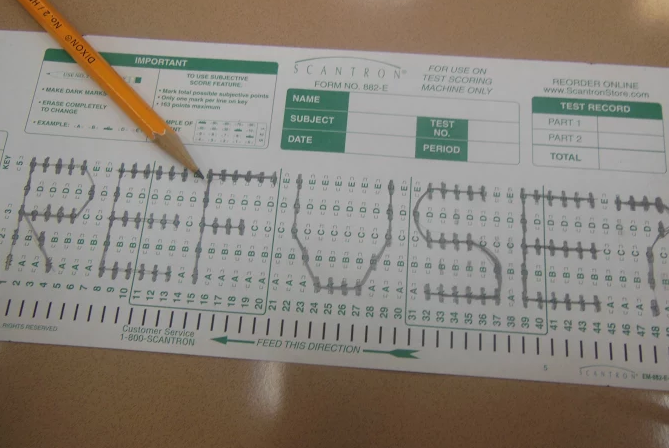Tests swapped: Should one opt?
Changes in standardized testing cause nationwide controversy on opting out of state-required assessments.
Homestead High School became the gathering place of the junior class at 8 a.m. on March 3 and March 4, 2015. Together, the whole grade battled the now required-by-law ACT exam.
Beginning with the 2014-2015 school year, the ACT and other standardized tests are now mandatory for all high school students. Among those standardized tests are the Aspire test for freshmen and sophomores, the WKCE social studies and science tests for sophomores and the now free WorkKeys and ACT exams for juniors.
In the past, fewer standardized tests were mandated by the law. Previous freshmen would take the Explore test, which was assessed by the school rather than the state. This year, the ninth grade students completed an assessment in both the fall (October) and this spring (April). “The Aspire test assesses students in the same areas as the ACT and includes a predicted ACT score,” Mrs. Lauren Croix, the Mequon-Thiensville School District data, research, and accountability coordinator said.
According to Mrs. Croix, in the past, the WKCE was administered to all students in tenth grade and evaluated students in the areas of reading, math, language arts, science and social studies. The test was mandated by the state of Wisconsin, so all tenth graders in the state completed this exam. This assessment was a paper and pencil assessment and was usually given in late fall (October/November.) Now, sophomores take the science and social studies portion of the WKCE and take the Aspire tests in the spring, similar to the freshmen.
“New this year for eleventh grade students was the [state-mandated] ACT. Although many students take the ACT during eleventh grade, this was the first year that the state of Wisconsin mandated that all eleventh grade students complete this test… students also completed the WorkKeys assessment, which was also a newly mandated assessment this year,” Mrs. Croix said. Before, juniors and seniors would take the SAT and ACT by choice. According to Principal Mr. Brett Bowers, 93 percent of all juniors last year took the ACT at least once.
On the other hand, this year, Tony Evers, superintendent of Public Instruction of Wisconsin initiated a new budget bill that enforces for the state to fund all high school juniors to take the ACT once. “This new law helps students who can only afford taking the ACT once and gives them the chance to take it more times than they could before. It’s a great opportunity for juniors,” Principal Mr. Brett Bowers said.
The new law, Pupil Assessment (118.30(2)(b)3,) establishes that “Upon the request of a pupil’s parent or guardian, the school board shall excuse the pupil from taking an examination administered under sub.” The new law regarding opt-outs offers many benefits for students but also has some downsides.
According to Mr. Bowers, in the past, the school’s average ACT score was calculated through taking the most recent score of every student who took the test and then finding an average that was used as the school’s composite ACT score. However with the new law, the test scores used to represent the school are going to be “the score of the day in March when mostly every junior takes the ACT,” Mr. Bowers said. For the students who took the ACT in December and were satisfied with their scores, taking the ACT in March again was not something they wanted to do. However, the state mandates the students to take the ACT in March and The State Report Card only looks at the March score, even if the December score was higher. This may lead to schools such as Homestead having a lower average.
Also, with new state mandated testing laws, some families of students feel the need to take their children out of standardized tests, or in other words, “opt-out.” At Homestead, one student took advantage of the opt-out act this year. The anonymous student is a freshman and opted out of the spring Aspire testing.
Over the past few years, opting out of state-required tests has been a nationwide controversy; people have opposing views on opt-outs and are voicing their opinions through boycotts and protests.
So far, only California, Utah and Wisconsin allow opt-outs in every single school district in the state but many people are pushing for extending the laws in other areas of the country.
According to the Huffington Post’s article, “Students Around the Country are Opting Out of Tests Even if State Law Doesn’t Allow It,” over 2,000 students from an Albuquerque, N.M. public school protested and mass opted out of the tests. These mass opt-outs could end up impacting the schools as funding is not received from the state if a certain percentile of students do not take the tests. “In many states … the guidance as to whether opt-outs are allowed is far less clear, as departments of education are often silent on the issue,” the report said. “Additionally, many states have no consequences in place for not participating in mandatory assessments, adding a further wrinkle to defining what it means for states to truly prohibit opt-outs.”
In Wisconsin, Jeremy Thiesfeldt, state representative and member of the Republican Party, is working to clear “confusion on the part of parents and schools as to which tests allow an opt out.” Representative Thiesfeldt said. “The tests are not required for grade promotion or graduation. There is no reason for state law to provide an opt-out for some grades and not others. This bill will make clear that the opt-out applies to grades 3-12, and requires schools to shine a brighter light on testing.”
At Homestead, “the ability for parents to opt their students out of state testing is not new this school year,” Mr. Matthew Joynt, assistant superintendent said. “Language has existed at the legislative level to afford parents the opportunity to opt their child out of state testing at grades four, eight, and ten for many years.This has been updated to include other grade levels since the state standardized testing assessments were updated this school year. Parents of students in all other grades have had the opportunity to opt out dependent on school district policy.”
For Homestead, the new tests were formed to be bench markers for the school. “These tests give us important data. For example, when new students come to our district, we know little about them and their test scores can help us assess them,” Mr. Bowers said. “The tests will help us see which students need academic support and also see which students are gifted.”
So far, the school received data about scores for freshmen Fall Aspire tests and sophomore WKCE Science and Social Studies Tests. Based on Mequon Thiensville School District’s data, this year on the WKCE, 94.5 percent of Homestead tenth grade students scored at the proficient or advanced level in science, and 96.8 percent scored at the proficient or advanced level in social studies. Across the state, 78.3 percent of all tenth grade students scored at the proficient or advanced level in science and 84.2 percent of the students scored at the proficient or advanced level in social studies.
The results of Homestead’s standardized tests “allow us to get a consistent profile of every student.” Mr. Bowers said. “They get us asking questions about whether we as a school are moving in the right direction or not.”

Sasha Milbeck is the senior Editor-in-Chief of Highlander Publications. Sasha is a self-diagnosed fontaholic and could spend all day in Room 405 if she...

Kacie Gross is a freshman. She is very involved in sports as she participated in a sport each trimester and enjoys her high school experience. As for...












John Wettstein • May 21, 2015 at 2:29 pm
Well written article by Sasha and Kacie. Good job.
Alex • May 18, 2015 at 7:43 pm
The problem with this standardized test is that it can be and is used for purposes other than just creating a measure to be used by the school system. The system has chosen ACT as the test, as such the score becomes part of the ACT record which stays with the child especially when applying for college. Simply put the problem they created for many students is that if a student already has a good score they may not want to jeopardize it. Similarly taking this test the first time a student unwittingly allows the ACT organization to share their information with universities the student is asked to identify as their interested in. Either way, by using a test that is also used for other purposes parents place their children at a potential disadvantage. How it makes the administrators life more difficult is completely irrelevant to anyone except the bureaucrats who run the system.